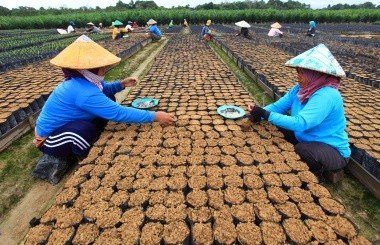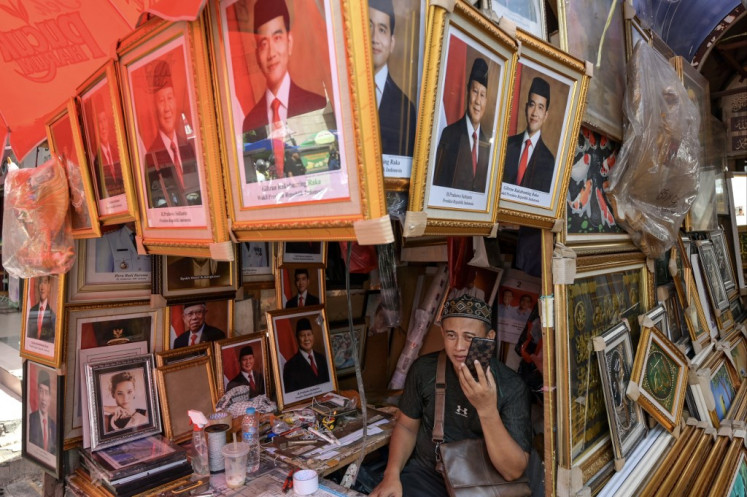Extend social protection
Poor citizens number around 30 million, while the near-poor amount to around 50-60 million. The government predicts informal workers will number over 60.4 million people by 2019.
Change Size
 Workers plant oil palm seedlings at a palm plantation in Kapuas Hulu, West Kalimantan. (Antara/Andre)
Workers plant oil palm seedlings at a palm plantation in Kapuas Hulu, West Kalimantan. (Antara/Andre)
I
span style="color: rgba(0, 0, 0, 0.8); font-family: Acta-Book; font-size: 17px; line-height: 24.2857px;">Indonesia’s informal sector still makes up the largest proportion of the economy. The failure of social protection to cover the roughly 65 percent of informal workers will almost certainly contribute to increased poverty levels and inequality in the near future.
The government has made significant progress in extending social protection schemes for informal workers under Law No. 40/2004, the National Social Security System ( SJSN ) Law, by guaranteeing coverage for informal workers through voluntary participation in five social insurance schemes. These are health insurance ( contributory and non-contributory ) and contributory worker’s insurance, which are old-age pension, employment injury, funeral allowance and provident fund pension. Active participation is through registration that requires information on beneficiaries’ characteristics and regular payments for those not eligible for the conditional cash transfer program.
According to the SJSN Law, the government should contribute to all five schemes for the poor. Currently, the government defines poor as people who consume less than 2,000 calories of food per day, or about US$1 per day or $30 per month; meanwhile $2 per day is considered “near-poor”.
Poor citizens number around 30 million, while the near-poor amount to around 50-60 million. The government predicts informal workers will number over 60.4 million people by 2019. The registration target for them is 6 percent by 2019.
In the past two years of implementing social health insurance, it has subsidized about 90 million poor citizens and registered about 30 million informal workers. Under the new old-age pension scheme commenced last year, the informal workers are required to participate voluntarily in the absence of government subsidy and other possible financing methods for this scheme.
Informal workers — being vulnerable workers, having irregular incomes and without formal employment contracts — should be supported as they are less likely to join existing schemes. One possible policy to overcome social risks borne by informal workers is a social pension financed by the tax system. Such a system could better serve the elderly who are no longer in the labor force, so they would not be a social burden for their family members.
Indonesia is still facing challenges in registering formal workers into a mandatory social security scheme — only some 15 percent of the employed labor force joined the former program, Jamsostek. The challenges of registering informal workers are naturally larger as their participation is still voluntary for all schemes.
However, it is a challenge that must be addressed, as workers who are not covered are likely to be highly vulnerable to poverty, particularly in retirement age or if they become unable to work. Revision of the current law requiring mandatory membership for informal workers could be a meaningful means to extend social protection coverage.
The vast majority of workers are still working under an informal mode that lacks documentation on employers and employees. Meanwhile, reform in business toward a simple and at-no-cost procedure is moving slowly — so many entrepreneurs tend to start businesses in an informal form to avoid red tape. This informality of business contributes to low compliance with the minimum wage, leading to huge resistance to contributing to social security.
All contributors in the existing social security schemes should have been registered in the national civil database through e-ID with its unique number, which has been used as an identifier number by the health coverage, BPJS Kesehatan, since 2014. Last year its registration code began to be shared with the employment insurance provider, BPJS Ketenagakerjaan.
However, there are still many citizens who have not yet registered with the current e-ID database for reasons such as lack of accessibility, low literacy, complex registration, geographical challenges, and low awareness of the advantages of having an e-ID.
There needs to be an improved mechanism to facilitate registration for formal and informal workers in social protection programs through local administrations. More informal workers would be willing to join the schemes as registration would be closer to where they live.
At the national level, committed effort is urgent to achieve universal social protection by strengthening inspectors within the national social security administration. to increase compliance of enterprises with existing schemes.
Also crucial is the speeding up of integration of fragmented old-age pension schemes now managed by three different institutions for civil servants, military and workers ( respectively PT Taspen, Asabri and BPJS Ketenagakerjaan ) rather than waiting until 2029 as targeted by the government.
Synchronizing social assistance and social insurance will improve the effectiveness and efficiency of the public funding to reach more uncovered beneficiaries.
Further on, integrated schemes between old-age pensions and provident fund pensions should increase efficiency for both employers and employees.
Establishing unemployment insurance as a substitute for severance payment mechanisms would certainly be beneficial in the case of enterprise bankruptcy.
Combined benefit schemes for injured workers under a health, employment injury and return to work program will bring about clear procedures in the case of working accidents and higher benefit levels for the injured, especially those working in the informal sector, which generally has low exposure to standardized occupational safety and health procedures.
***
The writer is an independent social policy analyst.
---------------
We are looking for information, opinions, and in-depth analysis from experts or scholars in a variety of fields. We choose articles based on facts or opinions about general news, as well as quality analysis and commentary about Indonesia or international events. Send your piece to community@jakpost.com.









